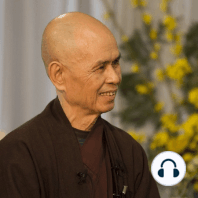20 min listen

Why do we practice walking meditation?
Why do we practice walking meditation?
ratings:
Length:
100 minutes
Released:
Jul 10, 2013
Format:
Podcast episode
Description
July 8, 2013. 100-minute dharma talk given by Thich Nhat Hanh from Upper Hamlet in Plum Village during the 2013 Summer Opening. This is the first talk of the summer.
Note: the brief segment at the beginning is missing.
We begin with a 25-minute introduction on listening to the chant. The art of suffering. If we know how to suffer then we suffer much less. It's like an organic gardener who knows it is useful to keep the garbage in order to nourish the flowers and vegetables. Understanding suffering is very important and we can use the energy of mindfulness to take care of our suffering. This is the heart of the Buddhist teaching. The first noble truth is there is suffering. The monks and the nuns will practice chanting this morning saying the name of Avalokiteshvara. They are getting in touch with the suffering.
The monks and nuns begin chanting the name Namo Avalokiteshvara from 25-minutes to 48-minutes. The main talk begins at 53-minutes into the recording.
As meditation practitioners, we should know how to generate peace, happiness, and joy. We can do this while walking, sitting, eating, drinking, etc. We can train ourselves. Listening to the bell is a reminder. Being alive in the present moment. It only takes 2-3 seconds to being mind and body together.
We have a 30-minute explanation of how and why we do walking meditation.
If you know how to handle the present moment then we are taking care of the future. I have arrived. I am home.
http://youtu.be/RNWv9biEGKY
Note: the brief segment at the beginning is missing.
We begin with a 25-minute introduction on listening to the chant. The art of suffering. If we know how to suffer then we suffer much less. It's like an organic gardener who knows it is useful to keep the garbage in order to nourish the flowers and vegetables. Understanding suffering is very important and we can use the energy of mindfulness to take care of our suffering. This is the heart of the Buddhist teaching. The first noble truth is there is suffering. The monks and the nuns will practice chanting this morning saying the name of Avalokiteshvara. They are getting in touch with the suffering.
The monks and nuns begin chanting the name Namo Avalokiteshvara from 25-minutes to 48-minutes. The main talk begins at 53-minutes into the recording.
As meditation practitioners, we should know how to generate peace, happiness, and joy. We can do this while walking, sitting, eating, drinking, etc. We can train ourselves. Listening to the bell is a reminder. Being alive in the present moment. It only takes 2-3 seconds to being mind and body together.
We have a 30-minute explanation of how and why we do walking meditation.
If you know how to handle the present moment then we are taking care of the future. I have arrived. I am home.
http://youtu.be/RNWv9biEGKY
Released:
Jul 10, 2013
Format:
Podcast episode
Titles in the series (100)
The Practice of Plum Village: May 10, 2012. 103-minute recording given at New Hamlet, Plum Village by Thich Nhat Hanh. This is a Day of Mindfulness and the monastics begin with two chants. - The practice of Plum Village is Applied Buddhism. by Thich Nhat Hanh Dharma Talks